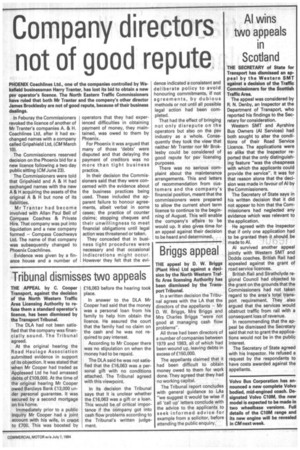Company directors not of good repute
Page 7

If you've noticed an error in this article please click here to report it so we can fix it.
PHOENIX Coachlines Ltd., one of the companies controlled by Wakefield businessman Harry Tranter, has lost its bid to obtain a new psv operator's licence. The North Eastern Traffic Commissioners have ruled that both Mr Tranter and the company's other director James Brocklesby are not of good repute, because of their business dealings.
In Feburay the Commissioners revoked the licence of another of Mr Tranter's companies A. & H. Coachlines Ltd, after it had exchanged names with a company called Gripshield Ltd, (CM March 10).
The Commissioners reserved decision on the Phoenix bid for a new licence following a two day public sitting (CM June 23).
The Commissioners were told that Gripshield and A & H had exchanged names with the new A & H acquiring the assets of the original A & H but none of its liabilities.
Mr Tranter had become involved with Allan Paul Bell of Compass Coaches & Private Hire. That company was put into liquidation and a new company formed — Compass Coachways Ltd. The name of that company was subsequently changed to Phoenix Coachlines.
Evidence was given by a finance house and a number of operators that they had experienced difficulties in obtaining payment of money, they maintained, was owed to them by Phoenix.
For Phoenix it was argued that many of those 'debts' were disputed and that delaying the payment of creditors was no more than tight business practice.
In their decision the Commissioners said that they were concerned with the evidence about the business practices being used. These included the apparent failure to honour agreements, albeit verbal in some cases; the practice of counter claims; stopping cheques and their unwillingness to meet financial obligations until legal action was threatened or taken.
They conceded that in business tight procedures were necessary and that occasional indiscretions might occur. However they felt that the evi dence indicated a consistent and deliberate policy to avoid honouring commitments, if not agreements, by dubious methods or not until all possible legal action had been completed.
That had the effect of bringing not only disrepute on the operators but also on the psv industry as a whole. Consequently they took the view that neither Mr Tranter nor Mr Broklesby could be considered of good repute for psv licensing purposes.
There was no serious complaint about the maintenance arrangements. This and letters of recommendation from customers and the company's financial position, meant that the commissioners were prepared to allow the current short term licence to continue to the beginning of August. This will enable the company's affairs to be would up. It also gives time for an appeal against their decision to be heard and determined.




























































































